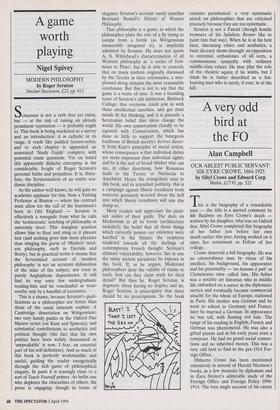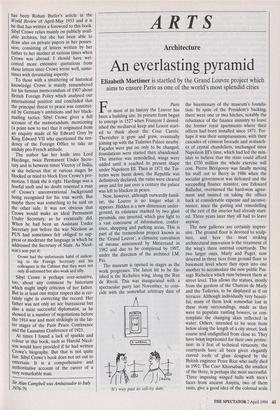A very odd bird at the FO
Alan Campbell
OUR ABLEST PUBLIC SERVANT: SIR EYRE CROWE, 1864-1925 by Sibyl Crowe and Edward Corp Merlin, 117.95, pp. 522 This is the biography of a remarkable man — the title is a quoted comment by Mr Baldwin on Eyre Crowe's death — written by his daughter, who was an Oxford don. Sibyl Crowe completed this biography of her father just before her own death earlier this year, having worked on it since her retirement as Fellow of her college.
Crowe deserved a full biography. He was an extraordinary man by virtue of his intellect, his background, his appearance
and his personality — homme a part' as Clemenceau once called him. His father was a notable art historian who in middle life embarked on a career in the diplomatic service and eventually became commercial attaché for the whole of Europe, stationed in Paris. His mother was German and he went to school in Germany and France; later he married a German. In appearance he was tall, with flaming red hair. The range of his reading in English, French and German was phenomenal. He was also a gifted pianist and in his early years even a composer. He had no grand social connec- tions and no inherited money. This was a very odd bird to find in the pre-1914 For- eign Office.
Hitherto Crowe has been mentioned extensively in several of Harold Nicolson's books, in a few memoirs by diplomats and in Zara Steiner's admirable study of the Foreign Office and Foreign Policy 1898- 1914. The best single account of his career has been Rohan Butler's article in the World Review of April-May 1953 and it is he that has written a foreword to this book. Sibyl Crowe relies mainly on publicly avail- able archives, but she has been able to draw also on private papers in her posses- sion, consisting of letters written by her father to her mother at various times when Crowe was abroad. I should have wel- comed more extensive quotations from these letters since Crowe wrote well, some- times with devastating asperity.
To those with a smattering of historical knowledge Crowe is mainly remembered for his famous memorandum of 1907 about British Foreign Policy which analysed our international position and concluded that the principal threat to peace was constitut- ed by Germany's ambitions and her black- mailing tactics. Sibyl Crowe gives a full account of the memorandum, mentioning (a point new to me) that it originated from an enquiry made of Sir Edward Grey by King Edward VII who questioned the ten- dency of the Foreign Office to take an unduly pro-French attitude.
The author has her knife into Lord Hardinge, twice Permanent Under Secre- tary and in between times Viceroy of India, as she believes that at various stages he blocked or tried to block Eyre Crowe's pro- motion. I think she is right. Hardinge was a fearful snob and no doubt resented a man of Crowe's unconventional background being recognised for his true worth. But maybe there was something to be said on the other side. It was not obvious that Crowe would make an ideal Permanent Under Secretary, as he eventually did. When he had been an Assistant Under Secretary just before the war Nicolson as PUS had sometimes felt obliged to sup- press or moderate the language in which he addressed the Secretary of State. As Nicol- son's son put it:
Crowe had the unfortunate habit of indicat- ing to the Foreign Secretary and his colleagues in the Cabinet that they were not only ill-informed but also weak and silly.
Sibyl Crowe is perhaps over-sensitive, too, about any comment by historians Which might imply criticism of her father. But in at least one major respect she is cer- tainly right in correcting the record. Her father was not only an ace bureaucrat but also a most successful diplomatist, as he Showed in a number of negotiations before the 1914 war and most strikingly in the lat- ter stages of the Paris Peace Conference and the Lausanne Conference of 1923.
At times I found a lack of sparkle and colour in this book, such as Harold Nicol- son would have provided if he had written Crowe's biography. But that is not quite fair. Sibyl Crowe's book does not set out to entertain. It is a comprehensive and authoritative account of the career of a very remarkable man.
Sir Alan Campbell was Ambassador to Italy 1976-79.



























































 Previous page
Previous page